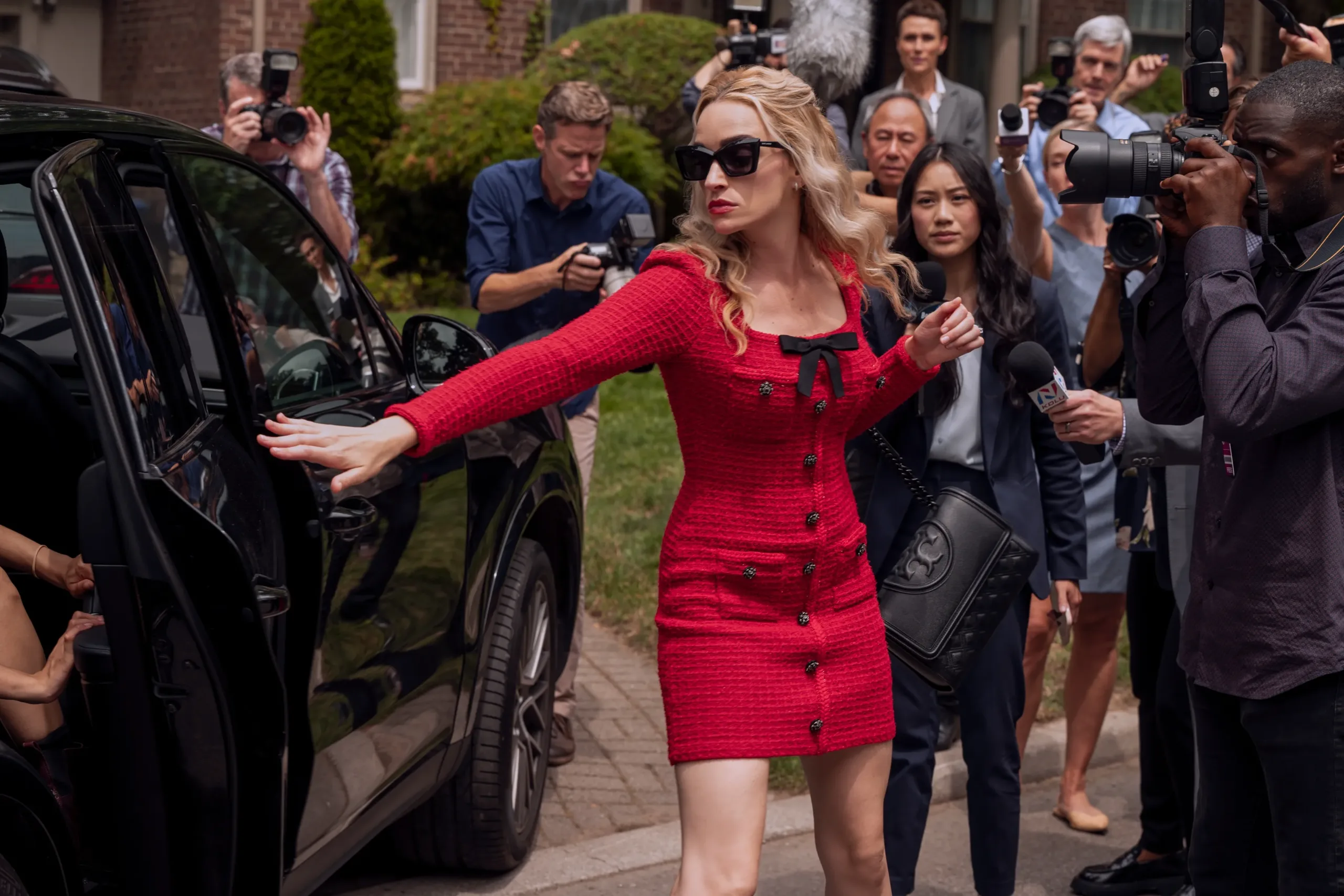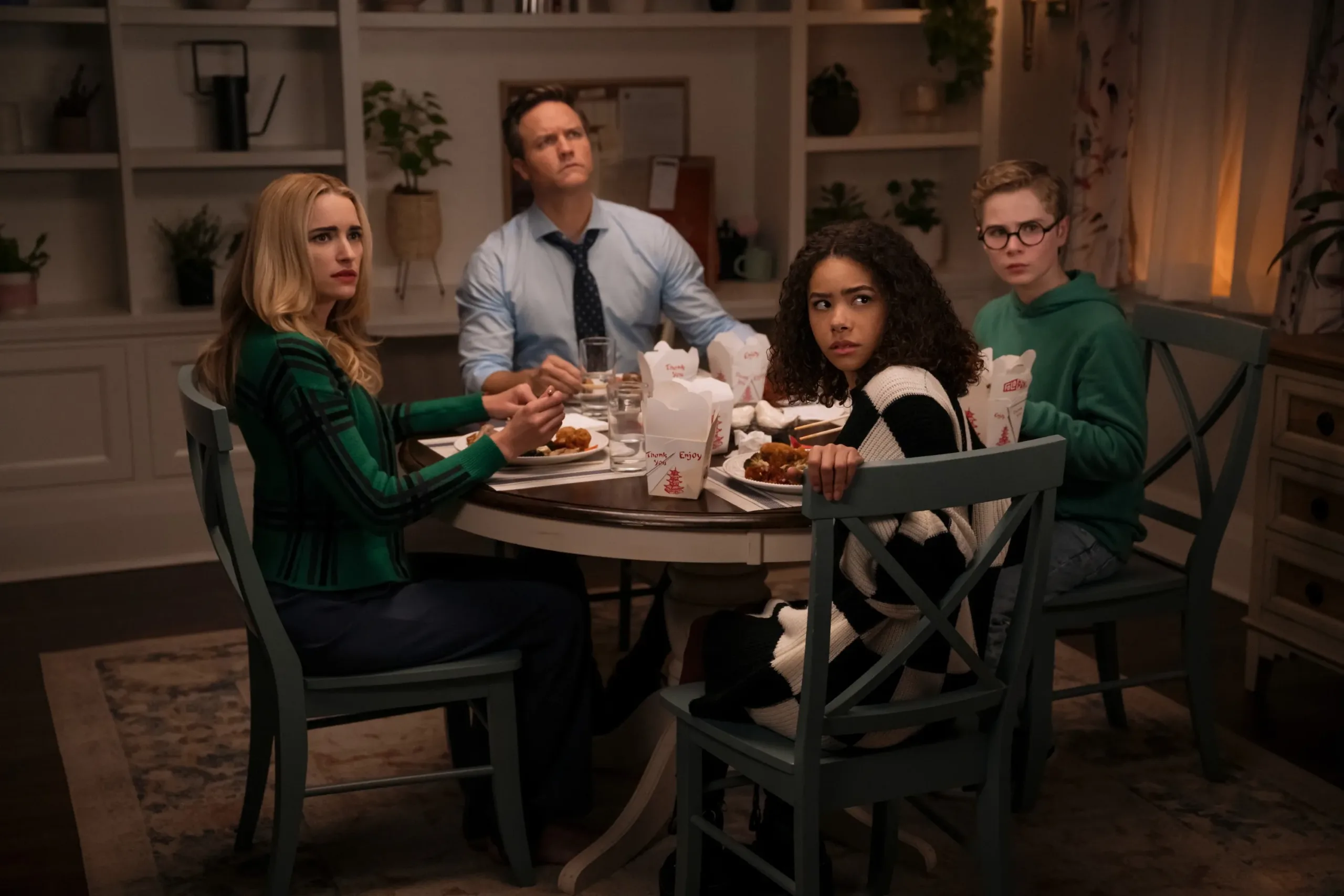The pristine artifice of Wellsbury, Massachusetts, finally splinters in the third season of Ginny & Georgia. The story opens moments after matriarch Georgia Miller finds her nuptial bliss exchanged for the cold finality of a jail cell, arrested for murder.
Her carefully constructed life with the town’s handsome Mayor, Paul Randolph, detonates, leaving her children, Ginny and Austin, to sift through the wreckage. This season places the Miller family into a legal crucible, scrutinized by a ravenous national media that tests their loyalties. Confined by house arrest, Georgia must fight for her freedom from a gilded cage.
Ginny confronts the twin battlegrounds of the high school gossip mill and the landscape of her own mind. Young Austin grapples with the weight of being the silent keeper of a traumatic secret. The series continues its signature alchemy of high-stakes drama and dark humor, pushing its examination of an emotionally fraught mother-daughter relationship into new, more desperate territory.
A Predator in a Gilded Cage
The season’s narrative engine is the systematic dismantling of Georgia Miller’s power. Her arrest for the morally clouded mercy killing of Tom Fuller neutralizes her greatest weapons: mobility and manipulation. Confined first to a cell and then to her home, she becomes a creature caged.
The ankle monitor, which she defiantly attempts to bedazzle, is a perfect symbol of her predicament—an ugly truth she tries to obscure with southern charm. Stripped of her agency, she is forced into a reactive state of observation, her manicured home transforming into both a prison and a voyeuristic perch in a direct nod to classic suspense cinema.
This paralysis immediately radiates outward, corroding her new marriage to Mayor Paul Randolph. He is a man whose entire political brand is built on clean-cut stability, now shackled to a woman whose past is a cascade of violent secrets. His wavering faith becomes a central tension, a quiet, agonizing battle between his affection for the captivating woman he married and the pragmatic fear of the killer she might actually be. The foundation of their union cracks under the weight of reasonable doubt.
Meanwhile, Georgia’s private struggle is swiftly repurposed for public consumption. Her trial becomes a modern media circus, a spectacle complete with devoted TikTok fans hailing her as a folk hero and a sensationalized TV movie that flattens her life into cheap melodrama.
The show winks at its own soapy DNA through these moments. Yet, the resolution of her trial eschews legal realism entirely for stark character truth. Her freedom, secured by framing an old enemy, is not a victory for justice but the ultimate reaffirmation of her life’s operating principle. For Georgia, survival is not just an instinct; it is a brutal art form that tolerates no morality but its own.
Portrait of the Daughter as a Young Witness
While Georgia performs for the world from her domestic stage, her daughter Ginny bears the weight of the fallout in the unforgiving theater of high school. The whispers in the hallways become an external chorus to her internal turmoil, reactivating old wounds.
Her struggle with self-harm impulses returns, not as a regression, but as a familiar ghost she now has the tools to confront. The sharp snap of a rubber band against her wrist is a small, private act of war against her own despair, a testament to a hard-won self-awareness that drives her back to therapy.
She finds a new language for her experience in poetry, transmuting the raw material of her fractured upbringing into verse. This creative catharsis, however, doubles as a potential courtroom liability, where every metaphor could be twisted into a confession and every line itemized as evidence. Her art becomes as dangerous as it is necessary.
This tension mirrors the state of her relationships. A love triangle between her brooding ex, Marcus, and an acerbic new classmate, Wolfe, offers familiar teenage drama, but the central relationship remains the complex codependency with her mother. It is a dance of manipulation and fierce, almost primal, loyalty, culminating in Ginny’s reaffirmation of their pact. She is both a victim of her mother’s choices and, by the end, her most steadfast defender, embracing their shared status as outlaws against the world.
An Ecosystem of Unhappiness
The series broadens its canvas of adolescent suffering this season, looking beyond Ginny to the troubled ecosystem of her peers. Nowhere is this shift more potent than in the storyline of young Austin. No longer just a background figure, he is recast as the keeper of the show’s most volatile secret, his silence a narrative time bomb.
The weight of what he has witnessed manifests in brief, shocking eruptions of chaos—an act like pouring hot coffee on a classmate becomes a startling glimpse into his trauma. Diesel La Torraca imbues the character with a gravity that makes his pivotal role in the family’s fate feel entirely earned.
The show offers its most nuanced psychological portraiture in the parallel struggles of the Baker twins, a thoughtful study in the two faces of depression. Marcus’s pain is a heavy, sinking quiet, a retreat into sullenness and alcohol.
Max’s, in contrast, is a frantic, bright desperation, a performative bubbliness that masks her profound sense of being unheard. Her loudness renders her invisible, a paradox captured with impressive range by Sara Waisglass. Her anxieties about her brother are dismissed, and her own romantic entanglements—a detached new girlfriend and the return of a complicated ex—only amplify her isolation.
This exploration of identity extends to the other teens. Abby begins a tentative queer relationship that, instead of fostering solidarity with Max, creates a curious friction, refusing a simplistic view of shared experience. It is within this tangled web of shifting loyalties that Abby’s long-simmering eating disorder is finally seen by those around her, another painful secret brought to light.
The Unstable Alchemy
The show’s defining quality is its precarious balance, a high-wire act performed between high camp and genuine trauma. The intense melodrama is frequently punctured by sharp, cynical wit.
A character like Max can dismiss a potential murder investigation with the darkly modern observation that it “wouldn’t even be a podcast,” while the gallows humor in Georgia and Ginny’s banter (“Where are we riding and why do we have to die!”) becomes a lifeline. The school musical, a confection of ‘70s pastiche, offers yet another layer of stylized lightness.
At the center of this tonal dissonance is Brianne Howey’s performance as Georgia. Her portrayal—an exaggerated, almost cartoonish Southern belle—exists in strange friction with the cold calculus of her character’s actions. The result is a central figure who feels perpetually out of sync with the darkness she creates.
This choice forces a question: does it elevate the material to a state of self-aware melodrama, or does it undercut the gravity of a story rooted in abuse and murder? The answer likely lies in one’s tolerance for the show’s frothy, hybrid nature, where the conventions of legal thriller and teen drama are deliberately unsettled by a performance that refuses to take its own horror entirely seriously.
A Shared Sentence
The season’s crucible forges a new, more troubling alloy of the mother-daughter bond. The trial dissolves any lingering boundaries, pulling Ginny from the role of reluctant accomplice into that of an active conspirator.
Their relationship deepens into a darker codependence, a shared knowledge of the crimes committed not just by Georgia, but for the family. Ginny’s journey is no longer about escaping her mother’s shadow but learning to navigate the darkness within it, becoming a willing participant in the “us against the world” ethos.
This is the season that finally itemizes the price of Georgia’s protection. Her actions, long framed as a fierce form of love, are revealed as a corrupting force, with young Austin serving as the primary casualty of her moral compromises.
The essential question is what future can be built on such a poisoned foundation. Now that Georgia has once again evaded legal justice, the family faces a different kind of life sentence, trapped in a repeating cycle of crisis and escape. This season makes it clear they cannot simply dance their problems away.
The third season of Ginny & Georgia, released on June 5, 2025. The series has been renewed for a fourth season, with the writers’ room actively developing new storylines. All episodes are available for streaming on Netflix.
Full Credits
Creator: Sarah Lampert
Showrunners: Debra J. Fisher (Seasons 1–2), Sarah Glinski (Season 3–present)
Writers: Sarah Lampert, Mike Gauyo, Danielle Hoover, David Monahan, Angela Nissel, Sarah Glinski, among others
Producers: Claire Welland, Todd Aronauer, Bonnie Adams, Ebonie Freeman, Brianne Howey
Executive Producers: Sarah Lampert, Debra J. Fisher, Anya Adams, Jeff Tahler, Jenny Daly, Dan March, Holly Hines, Lance Samuels, Daniel Iron, Armand Leo, James Genn, Angela Nissel, Sarah Glinski
Main Cast: Brianne Howey, Antonia Gentry, Diesel La Torraca, Felix Mallard, Sara Waisglass, Jennifer Robertson, Scott Porter, Raymond Ablack, Katie Douglas, Chelsea Clark, Nathan Mitchell
Directors of Photography: Gavin Smith, Asaf Benny
Editors: Erin Deck, Susan Shipton, Jonathan Eagan, Aren Hansen, Christopher Minns, Tiffany Beaudin, Lauren Brandon
Composers: Lili Haydn, Ben Bromfield
The Review
Ginny & Georgia Season 3
While its blend of high-stakes melodrama and caustic humor remains a deliberately unstable alchemy, Season 3 of Ginny & Georgia proves to be its most compelling and emotionally resonant outing yet. By placing its matriarch on trial, the series forces a reckoning that deepens its exploration of trauma, survival, and the corrosive nature of secrets. The expanded focus on its young cast provides a nuanced look at adolescent pain, making this season a surprisingly thoughtful character study disguised as a soapy, addictive thriller. It’s a chaotic, confident, and captivating continuation.
PROS
- Nuanced exploration of teen mental health and varied identities.
- Significant character development for the entire young cast, especially Austin.
- A central plot that effectively raises the stakes and tests core relationships.
- Sharp, witty dialogue that successfully balances the high-stakes drama.
CONS
- The tonal whiplash between high camp and serious trauma can be jarring.
- Georgia's consistently lighthearted performance sometimes feels at odds with the darkness of her actions.
- The main plot resolution prioritizes character consistency over legal realism.




















































